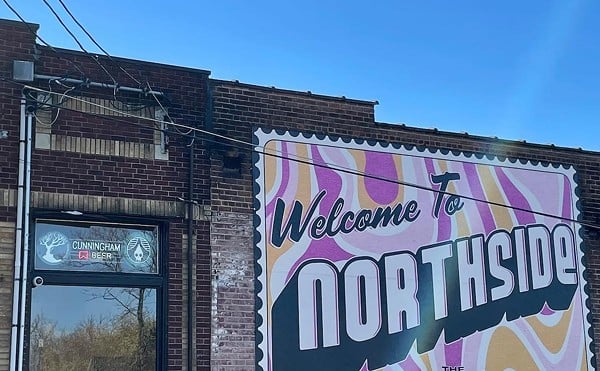Brian Powers, the Public Library of Cincinnati & Hamilton County archivist who has done so much research on King Records, has a theory why the Cincinnati record label was slow to get proper international respect as a progenitor of Rock & Roll.
All the other early sources of modern-era Rock are guitar-based — Rockabilly, Country, Chicago Blues and acoustic Folk and rural Blues. Many of King’s earliest and most transformative songs were of a form called “Jump Blues” — horn-based and with roots in the Big Band era.
“Jump Blues sounds more like Jazz and doesn’t get its due,” Powers says. “People think it’s not connected to Rock because it’s not guitar-based.”
And yet maybe the most important and familiar Guitar Rock song ever made — “Train Kept A’ Rollin,’ ” in which mimicking the rhythmic sound of that train has inspired electric guitarists in bands like The Yardbirds, Led Zeppelin, Metallica and Aerosmith — started life as a King-released Jump Blues tune by Tiny Bradshaw and His Orchestra. A 1956 version by the Memphis Rockabilly combo called Rock ‘n’ Roll Trio had an amazingly prescient guitar solo by Paul Burlison that featured an avant-garde fuzztone effect. Many consider it the first great Rock & Roll guitar solo.
“Train” was recorded 60 years ago Monday (July 25) at King’s historic headquarters on Brewster Avenue in Evanston, according to the authoritative King discography compiled by Michel Ruppli, who specializes in record-label discographies. (Other sources have listed different dates.)
In celebration and remembrance of the event’s 60th anniversary — and of Bradshaw’s life and contributions to both Cincinnati and Rock & Roll history — several free events are being planned by the Cincinnati USA Music Heritage Foundation.
“It was one of the many important songs that has origins here in Cincinnati we’ve never properly acknowledged or celebrated,” says Elliott Ruther, Foundation board president. “And that song has found prominence in every decade since it has been released. It has become a legendary Rock song.” (See sidebar.)
At 5 p.m. Monday on Fountain Square, there will be live performances of “Train” in its various permutations. There will be a rendering of Bradshaw’s Jump-Blues take with Marvin Hawkins on vocals (Bradshaw sang on the original) and featuring veteran local musician Philip Paul, who played drums in Bradshaw’s band for several years.
It will be followed by the Rockabilly version led by Ed Vardiman of the band Straw Boss and featuring the Syd Natanists (named after King founder Syd Nathan). For a Hard Rock version, at least 20 electric guitarists will take the stage as part of the Train Kept A’ Rollin’ Guitar Army. And anyone with an acoustic guitar can come down and join in.
At 6 p.m. on Monday, the Foundation will host a reception at its office in the old Herzog recording studio building (811 Race St., Downtown, on the second floor). At 7 p.m., there will be a panel discussion on Bradshaw’s life and music, featuring his former drummer Paul, King researcher Powers, Carl Bradshaw (Tiny’s grandson) and WNKU radio personality Mr. Rhythm Man.
Additionally,
WVXU will air a special radio program by Lee Hay on “The Train Kept A’ Rollin' and Tiny Bradshaw” this Saturday at 11 p.m. (Listen online at wvxu.org.)Bradshaw, a Youngstown native, was a successful big bandleader in the 1940s who turned to Jump Blues when he recorded for King in 1950. He had big R&B hits like “Well Oh Well” and “Soft,” and made Cincinnati his home. Along with touring, he played often at the West End’s Cotton Club. He died in 1958, after suffering a stroke, and is buried at Union Baptist Cemetery in Price Hill.
Drummer Paul hopes Monday’s events can create some of the same excitement Bradshaw sparked at Cincinnati’s Cotton Club — and on the road — in the 1950s.
“We had a tremendous following,” Paul says. “We would take up residence at Cotton Club and pack that place every night because people around here loved him. He was a charismatic man — big guy, handsome looking.”
Monday’s TRAIN KEPT A’ ROLLIN’ celebration begins at 5 p.m. on Fountain Square with live performances. Cincinnati USA Music Heritage Foundation (811 Race St., Downtown, second floor) hosts a reception and panel discussion about the song beginning at 6 p.m.
1950s
Tiny Bradshaw and His Orchestra - 1951
Jump Blues put the roll in Rock & Roll, and Tiny Bradshaw’s rollicking original version — with Bradshaw clearly yet exuberantly singing over that pumping barroom piano, the back-up vocalists chanting “all night long” and a fantastic, soaring saxophone solo — is a textbook example of how great it can sound. It’s exciting yet also relaxed and swinging.
Johnny Burnette's Rock ‘n’ Roll Trio - 1956
Apologies to Elvis and Gene Vincent, but Rockabilly never got better than this version, thanks to Johnny Burnette’s exhorting vocal and (especially) Paul Burlison’s guitar solo — one of the most influential ever in Rock — where he plays an octave apart from Burnette’s bass and manipulates the amplifier’s tube to get a distorted fuzz tone. (In a new book, Rockabilly: The Twang Heard ‘Round the World, a chapter posits that one Grady Martin actually played lead.) It’s a colossal riff.
1960s
The Yardbirds - 1966
This version from Having a Rave Up brought the song into the modern (post-Beatles) Rock era. Keith Relf’s double-tracked vocals are a little redundant but his harmonica is a nice touch. However, Jeff Beck’s searing, soaring, pre-psychedelic solo foretold of shapes of things to come.
The Yardbirds' "Stroll On" - 1966
This is the Holy Grail of “Train” versions, even though Relf was forced to change the lyrics for copyright reasons. It was used in Antonioni’s classic film Blow-Up, in which The Yardbirds — with Beck and Jimmy Page — perform it in a club, with Beck smashing his guitar. It’s an indelible, immortal Rock & Roll moment, even though Beck reportedly detested it.
Led Zeppelin
1970s
Aerosmith - 1974
An early standard bearer of classic Hard Rock, with Joe Perry’s guitar working supple, muscular lead runs off the basic riff without ever forgetting there’s a song underneath the soloing, and Steven Tyler pushing his yowling vocal Jaggerisms to the point where they become Tylerisms. One of Aerosmith’s five best songs.
Motorhead
1980s
Led Zeppelin
Hanio Rocks
Racer X
1990s
Guns N' Roses and Aerosmith
2000s
Metallica - 2009
For the jam celebrating their induction into the Rock and Roll Hall of Fame, Metallica joined Jeff Beck (also inducted), Jimmy Page, Joe Perry, Ron Wood and Flea in what James Hetfield calls “rhythm-guitar heaven.” Compared to most Metallica songs, this sounds almost genteel, but the head-slamming “Rock” is a long way from Bradshaw’s “roll.”
Alice Cooper - 2010
Mr. Alice Cooper has been returning to his Garage Rock roots on his nationally syndicated radio show, and the reunited (almost) original band does so too on a version of “Train” for the 2010 “Christmas Pudding” benefit in Phoenix. Cooper says he used to start shows with it long ago. Steve Hunter, who played guitar with Cooper after now-deceased Glen Buxton left, delivers a sizzling lead.





